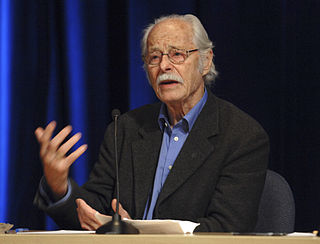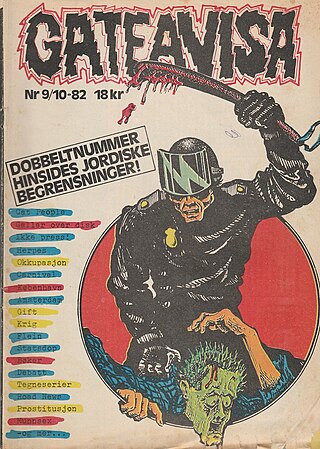
Oslo is the capital and most populous city of Norway. It constitutes both a county and a municipality. The municipality of Oslo had a population of 709,037 in 2022, while the city's greater urban area had a population of 1,064,235 in 2022, and the metropolitan area had an estimated population of 1,546,706 in 2021.

Peter Wessel Zapffe was a Norwegian philosopher, author, artist, lawyer and mountaineer. He is often noted for his philosophically pessimistic and fatalistic view of human existence. His system of philosophy was inspired by the German philosopher Arthur Schopenhauer, as well as his firm advocacy of antinatalism. His thoughts regarding the error of human life are presented in the essay "The Last Messiah". This essay is a shorter version of his best-known work, the philosophical treatise On the Tragic.
Bokmål is one of the official written standards for the Norwegian language, alongside Nynorsk. Bokmål is by far the most used written form of Norwegian today, as it is adopted by 85% to 90% of the population in Norway. There is no countrywide standard or agreement on the pronunciation of Bokmål and the spoken dialects vary greatly.

Kåre Isaachsen Willoch was a Norwegian politician who served as the 30th prime minister of Norway from 1981 to 1986 and as leader of the Conservative Party from 1970 to 1974. He previously served as the Minister of Trade and Shipping from August to September 1963 and 1965 to 1970, and as the president of the Nordic Council in 1973.

Bergens Tidende is Norway's fifth-largest newspaper, and the country's largest newspaper outside Oslo.
The Language Council of Norway is the administrative body of the Norwegian state on language issues. It regulates the two written forms of the Norwegian language: Bokmål and Nynorsk. It was established in 2005 and replaced the Norwegian Language Council which existed from 1974 to 2005. It is a subsidiary agency of the Ministry of Culture and has forty-four employees. It is one of two organisations involved in language standardization in Norway, alongside the Norwegian Academy.

Thomas Fredrik Weybye Barth was a Norwegian social anthropologist who published several ethnographic books with a clear formalist view. He was a professor in the Department of Anthropology at Boston University, and previously held professorships at the University of Oslo, the University of Bergen, Emory University and Harvard University. He was appointed a government scholar in 1985.

Dag Herbjørnsrud is a historian of ideas, author, a former editor-in-chief, and a founder of Center for Global and Comparative History of Ideas in Oslo. His writings have been published by Aeon, the American Philosophical Association (APA), Dialogue and Universalism, Cosmopolis, etc., and he was formerly a columnist for Al Jazeera English. Herbjørnsrud was the guest editor of a special issue of the bilingual journal Cosmopolis (Brussels), on "Decolonizing the Academy"; one of his contributors was the author and Professor Ngũgĩ wa Thiong'o. He sits on the Editorial Review Board of the book series Global Epistemics at Rowman & Littlefield.
Øystein Sørensen is a Norwegian historian. A professor at the University of Oslo since 1996, he has published several books on the history of ideas, including Norwegian nationalism and national socialism, as well as general Norwegian World War II history.

Norwegianization was an official policy carried out by the Norwegian government directed at the Sámi and later the Kven people of northern Norway, in which the goal was to assimilate non-Norwegian-speaking native populations into an ethnically and culturally uniform Norwegian population.

Gateavisa is a countercultural magazine. It was first produced by an anarchist collective in 1970 at Hjelmsgate 3 in Oslo and focuses on anti-authoritarian topics. In it heyday in the early 1980s, an issue examining the stolen rubbish of two prime ministerial candidates sold over 20,000 copies. In 2020, a book celebrated 50 years of the magazine.
Kebabnorsk, also known as Kebab Norwegian or Norwegian multiethnolect, is a language variant of Norwegian that incorporates words and grammatical structures from languages spoken by immigrants to Norway such as Turkish, Kurdish, Arabic, Urdu, Pashto, Persian, Punjabi, Tamil, and Chilean Spanish, as well as English. The multiethnolect differs from an ethnolect because it is spoken not by one particular ethnic group, but by the many varying immigrant populations in Norway, drawing elements from each of their respective languages. The Norwegian multiethnolect emerged from immigrant youth communities, particularly those in eastern neighborhoods of Oslo, and has spread to broader youth populations through permeation of mainstream Norwegian media. The term sociolect is also useful when discussing this variant, because sociological factors such as age, neighborhood, ethnic identity, and gender play important roles in classifying and understanding Norwegian multiethnolect.
Spynorsk mordliste is a derogatory term meant to disparage Nynorsk, one of the two official standards of written Norwegian. It is a pun on Nynorsk ordliste, the title of the "New Norwegian Word List", a Nynorsk dictionary.

Rune Slagstad is a Norwegian historian, philosopher, legal theorist, professor and journal editor. In addition to professional work, he has since the late 1960s contributed actively to public debate on a variety of issues from Norway.
Fridtjof Frank Gundersen was a Norwegian professor of jurisprudence and politician. He worked as a lector at the Faculty of Law of the University of Oslo from 1965 to 1975. In 1975 he became professor of jurisprudence at the Norwegian School of Economics.

Alfred Eriksen was a Norwegian priest, politician, newspaper editor and non-fiction writer.

Christen Henriksen Pram was a Norwegian/Danish economist, civil servant, poet, novelist, playwright, diarist and magazine editor. He is held as the first Norwegian novelist, although his writing was carried out in the Danish language.
Mette Andersson is a Norwegian sociologist. She is Professor of Sociology at the University of Bergen. Her fields of expertise are cultural and political sociology, especially migration, ethnicity and racism, identity and identity politics, social movements, sociology of sport, transnationality and religion.
The Research Council of Norway's Award for Excellence in Communication of Science is awarded annually by the Research Council of Norway, a Norwegian government body. According to its bylaws, the prize is to be given in order to "reward and stimulate the dissemination of research to a broad audience. The dissemination must be of high quality in both form and content." The price is worth 500000 kr.
Tord Larsen is a Norwegian social anthropologist. He is professor emeritus of social anthropology at the Norwegian University of Science and Technology (NTNU).











